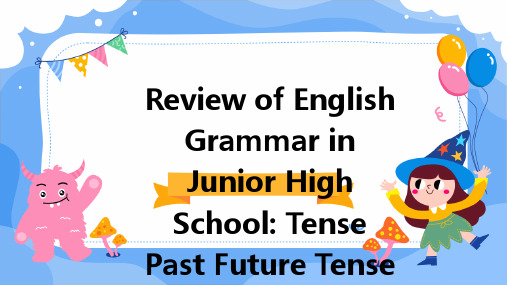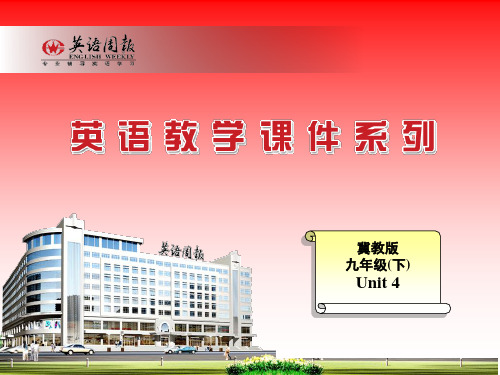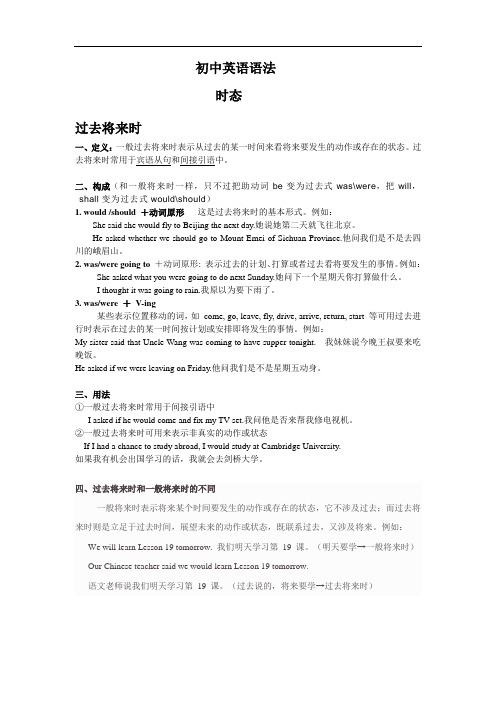九年级英语过去将来时
初三英语语法复习时态过去将来时

03
The Context and Meaning of the Past
and Future Tense
Representing past predictions
Predicting the weather in the past
"Yesterday, the forecast said it would rain today."
06
Summary and Review
A Key Review of the Past and Future Tense
Past Tense Review
Simple Past: Describes actions in the past, e.g., "I walked to the park yesterday."
Simple future tense
The simple future tense is formed by using the base form of the verb plus the future tense suffix "-will". For example, "will walk" is the simple future tense of "walk".
Distinction
The simple past tense is used to talk about past actions that have already happened. For instance, "She went to the park yesterday."
Comparison with the past continuous tense
初中英语语法系列-过去将来时

Unit 4
过去将来时的定义
• 过去将来时表示从过去的某一时间看将 要发生的动作或存在的状态。它是一个 相对的时态,即立足于过去某时,从过 去的某一时间看即将发生构成
• 构成
基本形式为 would(should)+ 动词原形
e.g He told me that he would see me off at the station. I rang up to tell my father that I should go home next Monday. 过去将来时也可用was(were)going to +动词原形; was(were)about to + 动词原形; was(were)to +动词原形表示过去某时间内计划\ 打算或一定要进 行的动作。
• 1.在时间和条件状语从句中,常用一般过去时来 表示过去将来时。例如: He said he would come to see you when he had time. 他说他有时间就来看望你。 • 2.“would+动词原形”可表示过去习惯性的动 作。此时,不管什么人称,都可用would。 注意 和used to 区别。 When he was a child he would get up early. 他年幼时,总是很早起床。
习题精选
• 1.We were all surprised when he made it clear that he ____ office soon.(MET93) • A.leaves B.would leave C.left D.had left • 2.— Alice, why didn't you come yesterday? • — I ____ ,but I had an unexpected visitor.(NMET97) • A.had B.would C.was going to D.did
初三英语常用语法时态知识点:过去将来时.doc

2019长沙初三英语常用语法时态知识点:过去将来时导读:一般过去将来时表示从过去的某一时间来看将来要发生的动作或呈现的状态。
在英语时态中,“时“指动作发生的时间,”态“指动作的样子和状态。
一般过去将来时的出发点是过去,即从过去某一时刻看以后要发生的动作或状态。
在此,长沙新东方整理分享了2019长沙初三英语常用语法时态知识点:过去将来时,以供学习与参考,希望对大家有所帮助。
1. 概念:立足于过去某一时刻,从过去看将来,常用于宾语从句中。
2. 时间状语:the next day(morning, year),the following month(week),etc.3. 基本结构:①was/were/going to + do;②would + do.否定形式:①was/were/not + going to + do;②would + not + do.一般疑问句:①was或were放于句首;②would 提到句首。
4. 用法1) “would+动词原形”常表示主观意愿的将来。
例如:He said he would come to see me.他说他要来看我。
He told me he would go to Beijing.他告诉我他将去北京。
2) “was/ were+going to+动词原形”常表示按计划或安排即将发生的事。
例如:She said she was going to start off at once.她说她将立即出发。
I was told that he was going to return home.有人告诉我他准备回家。
此结构还可表示根据某种迹象来看,很可能或即将发生的事情。
例如:It seemed as if it was going to rain.看来好像要下雨。
3) come,go,leave,arrive,start等瞬时动词动词可用过去进行时表示过去将来的含义。
英 语语法 过去将来时及初中时态归纳

初中英语语法时态过去将来时一、定义:一般过去将来时表示从过去的某一时间来看将来要发生的动作或存在的状态。
过去将来时常用于宾语从句和间接引语中。
二、构成(和一般将来时一样,只不过把助动词be变为过去式was\were,把will,shall变为过去式would\should)1. would /should +动词原形这是过去将来时的基本形式。
例如:She said she would fly to Beijing the next day.她说她第二天就飞往北京。
He asked whether we should go to Mount Emei of Sichuan Province.他问我们是不是去四川的峨眉山。
2. was/were going to+动词原形: 表示过去的计划、打算或者过去看将要发生的事情。
例如:She asked what you were going to do next Sunday.她问下一个星期天你打算做什么。
I thought it was going to rain.我原以为要下雨了。
3. was/were +V-ing某些表示位置移动的词,如come, go, leave, fly, drive, arrive, return, start 等可用过去进行时表示在过去的某一时间按计划或安排即将发生的事情。
例如:My sister said that Uncle Wang was coming to have supper tonight. 我妹妹说今晚王叔要来吃晚饭。
He asked if we were leaving on Friday.他问我们是不是星期五动身。
三、用法①一般过去将来时常用于间接引语中I asked if he would come and fix my TV set.我问他是否来帮我修电视机。
②一般过去将来时可用来表示非真实的动作或状态If I had a chance to study abroad, I would study at Cambridge University.如果我有机会出国学习的话,我就会去剑桥大学。
初中英语语法:过去将来时

初中英语语法:过去将来时一、过去将来时的含义过去将来时表示在过去某个时间看来将要发生的动作或存有的状态。
过去将来时常用于宾语从句和间接引语中。
例如:I didn‘t know if he would come.我不知道他是否会来。
They never knew that population would become a big problem.他们从来都不知道人口问题将会成为一个大问题。
推荐信息英语四级写作句型六大成分英语的句子四级写作必备句型直接引语转换间接引语四级写作书信写作常用句零冠词的讲解英语四级写作好句定冠词讲解及口诀She didn‘t tell me where she would go.她没有告诉我她要去哪儿。
Betty said she would visit the Great Wall next Saturday.贝蒂说下周六她要去参观长城。
二、过去将来时的表达法(一)“would+动词原形”。
常表示按计划或安排即将发生的事。
例如He said he would come to see me.他说他要来看我。
He told me he would go to Beijing.他告诉我他将去北京。
(二)“was/ were+going to+动词原形”。
常可用来表示按计划或安排即将发生的事。
例如:She said she was going to start offat once.她说她将立即出发。
I was told that he was going to return home.有人告诉我他准备回家。
此结构还可表示根据当时情况判断有可能但不一定会发生某事。
例如:It seemed as if it was going to rain.看来好像要下雨。
(三)come,go,leave,arrive,start等动词可用过去实行时代替过去将来时。
例如:He said the train was leaving at six thenext morning.他说火车将于第二天早晨六点离开。
初中英语时态知识点:过去将来时的标志词

初中英语时态知识点:过去将来时的标志词一、would+动词原形表示过去将来时would+动词原形构成过去将来时,常表示根据计划或安排即将发生的事。
例1:He said he would come to see me.他说他要来看我。
例2:He told me he would go to Beijing.他告诉我他将去北京。
二、was /were+going to+动词原形表示过去将来时was /were+going to+动词原形也可表示根据计划或安排即将发生的事。
例1:She said she was going to start at once.她说她将立即出发。
例2:I was told that he was going to return home.有人告诉我他准备回家。
was /were+going to+动词原形还可表示根据当时情况判断有可能但不一定会发生某事。
例:It seemed as if it was going to rain.看来好像要下雨。
三、某些动词的过去进行时可表示过去将来时come,go,leave,arrive,start 等严格按照时间表发生的表起止的动词可用过去进行时代替过去将来时。
例1:He said the train was leaving at six the next morning.他说火车第二天早晨出发。
例2:She told me she was coming to see me.她告诉我她要来看我。
四、特定场合的一般过去时可表示过去将来时条件状语从句和时间状语从句中须用一般过去时代替过去将来时。
例1:I didn't know when she would come, but when she came Iwould let you know.我不知道她什幺时候来,但她来了我会告诉你。
析:第一个when 引导宾语从句,可使用将来时,第二个when 引导时间状语从句,只能用一般过去时代替过去将来时。
过去将来时知识点归纳与总结

过去将来时知识点归纳与总结过去将来时是英语中的一种时态,用于表示过去某一时间点或某一事件之后将要发生的动作或状态。
本文将对过去将来时的知识点进行归纳与总结。
一、过去将来时的构成过去将来时由助动词"would"加动词原形构成,也可以使用"was/were going to"或"was/were + 动词+ing"来表示。
例如:"I would visit my grandmother tomorrow."(我明天将要去看望我的祖母。
)二、过去将来时的用法1. 表示过去某一时间点之后将要发生的动作或状态。
例如:"He said he would call me later."(他说他过会儿会给我打电话。
)2. 表示过去的推测或猜测。
例如:"I thought she would be angry, but she wasn't."(我以为她会生气,但她并没有。
)3. 表示过去的习惯或经常性动作。
例如:"When I was young, I would often go swimming in the river."(小时候,我经常去河里游泳。
)三、过去将来时的时间状语过去将来时常常与一些特定的时间状语连用,如"tomorrow"(明天)、"next week"(下周)、"in the future"(在将来)等等。
这些时间状语可以帮助我们更准确地理解句子的意思。
四、过去将来时与其他时态的区别过去将来时与其他时态的区别主要在于时间上的不同。
过去将来时表示过去某一时间点之后将要发生的动作或状态,而其他时态则表示不同的时间关系。
例如,现在完成时表示过去发生的某个动作对现在产生的影响,而将来进行时表示将来某一时间点正在进行的动作。
初中英语语法课件-过去将来时

时态一致性 在条件状语从句和时间状语从句中,如果主句描述
的是过去的情况,那么从句中原本应该使用一般将来 时的动作,需要改为过去将来时,以保持一致的时态。 If it didn’t rain, we would go for a walk. 如果不下雨,我们就会去散步。
表示从过去某一时间来看将要发生的动作或存在的状 态, 常用于宾语从句中。 He said there would be a concert that evening. 他说晚上将有一场音乐会。
初中英语语法课件
过去将来时
过去将来时表示在过去 某个时间点看来将要发 生的动作,常用在间接 引语或者宾语从句中。
a. 过去将来时由“ should/ would+动词原形”构成 b. 第1人称 I、 we在句中作主语时, 可以 用 should 或 would c.其他人称在句中作主语时, 都用 would
practice
Practice
1.Li Ming said he _____ happy if Brian _____ to China next month. A. as; come B. was; would come C. would be; came D. will be; come
Practiபைடு நூலகம்e
(4) was/were about to + 动词原形型
这种方式强调动作发生的紧迫性,即某个动作在说话人 提及的那一刻即将发生,但尚未发生。 We were about to leave when the phone rang. 我们正要离开,这时电话响了。
(5) 过去进行时(was/were + 现在分词)型
表示过去习惯性的动作。 Every evening he would go and talk with the workers. 每天晚上他都和工人交谈。
- 1、下载文档前请自行甄别文档内容的完整性,平台不提供额外的编辑、内容补充、找答案等附加服务。
- 2、"仅部分预览"的文档,不可在线预览部分如存在完整性等问题,可反馈申请退款(可完整预览的文档不适用该条件!)。
- 3、如文档侵犯您的权益,请联系客服反馈,我们会尽快为您处理(人工客服工作时间:9:00-18:30)。
九年级英语过去将来时一、初中英语过去将来时1.I go out to have a walk when they opened the door.A. am about toB. was about toC. went toD. have to【答案】 B【解析】【分析】句意:他们开门时我正要出去散步。
根据句意,可知我还没有出去,是打算出去散步,故排除C和D,又因为when后用的是一般过去式,故句子要用一般过去式,”be about to do sth将要做某事“的过去将来时为was/ were about to,主语I,故用be 动词was,因此选B。
【点评】考查过去将来时。
注意识记be about to do sth的用法。
2.Mr. Wu said he ______ us to the zoo the next week.A. would takeB. will takeC. takeD. takes【答案】 A【解析】【分析】通过分析本句可知,本句是一个宾语从句。
根据next week可知,从句应该将来时,故排除CD;在宾语从句中,主句用过去时,则从句也应该用过去时的某种形式,故用would take。
所以本题选A。
【点评】对于宾语从句应该注意四点:1、语序:用陈述句语序;2、引导词:A.that B.特殊疑问词C.if/whether 3、时态:•当主句是一般现在时,从句的时态根据从句的时间变化‚当主句的时态是过去时时,从句应该用过去的某种时态ƒ当从句表示客观事实或客观真理等时,从句要用一般现在时。
4、人称:根据实际情况变换人称。
而本题只考查了时态。
3.I didn't know when he _____ back. He said he would call me when he _____ home.A. would come, gotB. came, gotC. will come, getsD. came, would get【答案】 B【解析】【分析】句意为:我不知道他什么时候回来。
他说他一回来就给我打电话。
前句是when引导的宾语从句,根据语境应用一般过去时。
后句是when引导的时间状语从句,主句用过去将来时,从句用一般过去时。
故选B。
【点评】考查从句的时态。
4.—What did the teacher say to you just now?—She asked _______.A. where did I buy the dictionaryB. where I bought the dictionaryC. where do I buy the dictionaryD. where I buy dictionary【答案】 B【解析】【分析】考查宾语从句。
一方面,宾语从句要用陈述语序;另一方面,主句是一般过去时,宾语从句也要用过去的某种时态,故选B。
5.Tim told us that his company ______ robots to do some of the work.A. usesB. will useC. has usedD. would use【答案】 D【解析】【分析】句意:Tim 告诉我们他的公司将要使用机器人来做一些工作。
此题主句是过去时, 所以从句也必须是过去的某种时态, 采用排除法, 故选D。
【点评】过去将来时6.— What time shall we leave for the airport?— It's foggy today. I'm not sure be closed soon. Let's go now.A. whether the highway willB. whether will the highwayC. when the highway willD. when will the highway【答案】A【解析】【分析】句意:――我们什么时间出发去机场?――今天多雾。
我不确定高速公路是否很快要关闭。
我们现在就走吧。
be sure后跟的是宾语从句,宾语从句要用陈述句语序,B、D错;soon与when含义重复,C错。
故选A。
【点评】考查宾语从句7.— ________ you reading at this time yesterday?— No, I was ________.A. Were; singingB. Are; watching TVC. Were; danceD. Are; having a rest 【答案】A【解析】【分析】句意:昨天这个时候你在读书吗?不,我在唱歌。
时态为一般过去时。
故选A。
【点评】考查时态。
8.— What did the teacher say just now?— Sorry. I didn't catch it. I ________ about something else.A. thinkB. will thinkC. was thinkingD. thinks【答案】C【解析】【分析】句意:-老师刚才说什么了?-对不起。
我没赶上。
我在想别的。
表示过去正在进行的事用过去进行时。
故选C。
【点评】考查时态。
9.When she was in China, she to some Chinese after doing morning excise.A. talkB. talksC. talkedD. would talk【答案】D【解析】【分析】句意:当她住在中国的时候,她会在晨练之后和一些中国人聊天。
When引导时间状语从句,从句用一般过去时,主句用过去将来时,would+动词原形,表示过去习惯性的动作。
故选D。
【点评】考查would+动词原形表习惯性动作。
10.She a rest after long time's work two years ago.A. would haveB. will haveC. hasD. have【答案】A【解析】【分析】句意:两年前她长时间工作之后就会休息一会。
two years ago是过去时的时间状语,休息是长时间工作之后发生的事情,would+过去原形,表示过去习惯性的动作。
故选A。
【点评】考查would+动词原形表习惯性动作。
11.When we lived in Hangzhou ten years ago, we for a walk after dinner.A. goB. would goC. wentD. goes【答案】B【解析】【分析】句意:当十年前我们还住在杭州的时候,我们吃完晚饭会出去散步。
When引导时间状语从句,从句用一般过去时,主句用过去将来时,would+动词原形,表示过去习惯性的动作。
故选B。
【点评】考查would+动词原形表习惯性动作。
12.Sina said she ______ to school the next Sunday.A. wouldn't goB. isn't goC. didn't goD. won't go【答案】 A【解析】【分析】句意:希娜说她下周日不想去学校了.结合语境可知从句中描述的是站在过去角度看将来发生的动作,故用过去将来时态,选A.【点评】英语中的时态主要是借助于时间状语与上下文语境来进行判断。
解答此类题型,首先要注意句子中的时间状语,如果没有则要通过分析上下文,结合语境来判断句子的时态。
英语疑问句中一般具有时态上的对应关系,注意结合这一特点进行区分。
13.Mr. Wang said he ______ us ______ for another two weeks.A. will allow; to workB. will allow; workC. would allow; to workD. has allowed; work 【答案】 C【解析】【分析】句意:王先生说他将允许我们再工作两周。
根据句子结构可知,这是含有宾语从句的主从复合句,主句的谓语动词是said,是过去时,故从句也要用过去的某种时态;从句的时间状语是for another two weeks,又两周,所以从句是将来时,故用过去将来时,所以第一个空填would allow;另外第二个空allow sb. to do sth.允许某人做某事,固定短语,故选C。
【点评】此题考查宾语从句和固定短语。
注意从句的时态和allow sb. to do sth.固定短语。
14.Our air-conditioners sell well, but decades of years ago no one could have imagined such a big share in the market that they ________ .A. were to haveB. were havingC. have hadD. had had【答案】 A【解析】【分析】句意:我们的空调畅销,但是十年前没有人能够想象他们将会有这么大的市场份额。
根据句意可知,该处的时态应为过去将来时,were to have表过去将来时,故选A。
【点评】考查时态,本题涉及过去将来时。
15.It was believed that the TV series The Legend of Miyue _______________ millions of people soon.A. would attractB. has attractedC. will attractD. attracted【答案】 A【解析】【分析】句意:人们相信,电视连续剧《羋月传》很快就会吸引数百万人。
本句是宾语从句。
因为主句是过去时态,所以从句要用某种过去时态,B,C不对;根据后面的soon 可以知道,应该是过去将来时态;故答案为A。
【点评】考查过去将来时的基本结构及用法。
注意would是will的过去式。
16.Kate said that she _____________ us as soon as she got home.A. calledB. callsC. will callD. would call【答案】 D【解析】【分析】句意:凯特说她一到家就打电话给我们。
分析句子结构可知,此处是宾语从句,主句时态为一般过去时,从句时态根据主过从过原则可知,从句应该用相对应的过去时;再根据从句结构可知,从句为as soon as引导的条件状语从句,时态根据主将从现原则,主句用一般过去时,从句应该用过去将来时,用would do形式,故选D。
